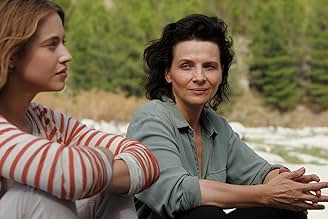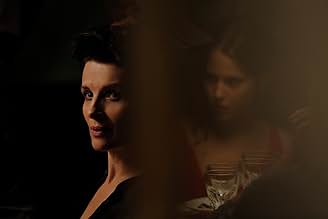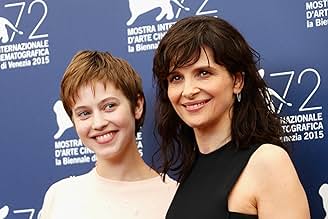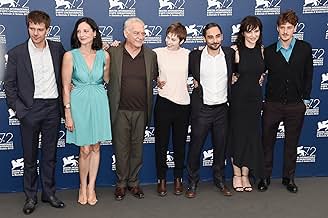IMDb RATING
6.5/10
2.7K
YOUR RATING
A mother unexpectedly meets her son's fiancée at a villa in Sicily and gets to know her as she waits for her son to arrive.A mother unexpectedly meets her son's fiancée at a villa in Sicily and gets to know her as she waits for her son to arrive.A mother unexpectedly meets her son's fiancée at a villa in Sicily and gets to know her as she waits for her son to arrive.
- Awards
- 7 wins & 9 nominations total
Featured reviews
This is a haunting movie, but I think it could have used a tad more plot. Even Binoche's genius for ambiguous facial expressions strains to paper over deficiencies in the story.
I was intrigued to see that it was based on a Pirandello play, but "based" is too strong - it's at best inspired by "La vita che ti diedi", and from what I can tell (I'm not fluent in Italian) the movie omits most of the play's boldest psychological points.
I was intrigued to see that it was based on a Pirandello play, but "based" is too strong - it's at best inspired by "La vita che ti diedi", and from what I can tell (I'm not fluent in Italian) the movie omits most of the play's boldest psychological points.
There is a kind of celebration that is cathartic and without it, grief can not release itself from its prison. In the space between loss and acceptance, lie denial and the hope for a miracle, for the light to shine through the heart.
In this extraordinary period of denial, time stretches into moments of grief, anger and hope, the meeting of reality with the loss of love is undefined, is fated to be revealed but if it can not, then the actions of those frozen in that vast expanse of waiting can not be predicted.
This is calm before the storm but the storm never arrives, it is the house that creaks with the stuff of haunting but the ghosts only wander into dreams.
L'attesa (The Wait) is shot in an old Sicilian villa, it moves in lingering pauses in which the exalted photographic beauty of this extended suspension, truth attempting to surface but underwater. Binoche carries the deepening mystery in precise nuanced expression. The nails hammered into the walls to shroud mirrors, the lime annointment of olive trees bleaches the trunk bone white, and awaiting the miracle, knowing in truth is freedom, unable to see past belief and hope.
Excellent film in every respect, music, photography and direction. Resolution is unavailable as the echoes of celebration fade.
In this extraordinary period of denial, time stretches into moments of grief, anger and hope, the meeting of reality with the loss of love is undefined, is fated to be revealed but if it can not, then the actions of those frozen in that vast expanse of waiting can not be predicted.
This is calm before the storm but the storm never arrives, it is the house that creaks with the stuff of haunting but the ghosts only wander into dreams.
L'attesa (The Wait) is shot in an old Sicilian villa, it moves in lingering pauses in which the exalted photographic beauty of this extended suspension, truth attempting to surface but underwater. Binoche carries the deepening mystery in precise nuanced expression. The nails hammered into the walls to shroud mirrors, the lime annointment of olive trees bleaches the trunk bone white, and awaiting the miracle, knowing in truth is freedom, unable to see past belief and hope.
Excellent film in every respect, music, photography and direction. Resolution is unavailable as the echoes of celebration fade.
This visually beautiful, if self-consciously arty, Italian film marks the feature debut of Piero Messina who certainly displays all the promise of a major film-maker if he can only learn to move things along at a somewhat more acceptable pace and be less concerned with the 'look' of his films and more concerned with the feelings of his characters. This is a somewhat high-toned piece based on a play by Pirandello and it's very much designed around the performances of Juliette Binoche as a grieving mother and Lou de Laage as her son's girlfriend. It's certainly well done but it also smacks of the worst kind of art-house cinema; this is Antonioni-light. See it by all means though you may have to keep pinching yourself from time to time to stay awake.
"The Wait" ("L'Attesa") is a film that has really nice acting but the story itself didn't do much for me. Its vague ending left me cold and the behaviors of the leading lady, Anna (Juliet Binoche) just didn't make a lot of sense--regardless of what REALLY happened at the end.
When the film begins, Jeanne (Lou de Laâge) arrives at a Sicilian villa and instead of being greeted, she's given a meal by a servant and then retires to bed without seeing the woman of the house, Anna. The next day, Jeanne comes downstairs and finds that there's been some sort of funeral...and Jeanne tells her it's because her brother died...though it's pretty obvious that this might NOT be the truth. Jeanne has come to see Anna's son and spend her vacation with him....but through the course of the film, the son never arrives and Jeanne is feeling abandoned...though Anna and her seem to have a few moments together bonding.
Where does all this go? Well, as I mentioned above, the ending is a bit vague and it's easy to see two very different interpretations. I didn't really care about either one because Anna's actions simply didn't make much sense....and because of that the film lost me. Well acted, this film needed some better writing as the characters didn't always seem realistic or believable.
When the film begins, Jeanne (Lou de Laâge) arrives at a Sicilian villa and instead of being greeted, she's given a meal by a servant and then retires to bed without seeing the woman of the house, Anna. The next day, Jeanne comes downstairs and finds that there's been some sort of funeral...and Jeanne tells her it's because her brother died...though it's pretty obvious that this might NOT be the truth. Jeanne has come to see Anna's son and spend her vacation with him....but through the course of the film, the son never arrives and Jeanne is feeling abandoned...though Anna and her seem to have a few moments together bonding.
Where does all this go? Well, as I mentioned above, the ending is a bit vague and it's easy to see two very different interpretations. I didn't really care about either one because Anna's actions simply didn't make much sense....and because of that the film lost me. Well acted, this film needed some better writing as the characters didn't always seem realistic or believable.
Anna's house is in mourning. As the mirrors are covered and the doors a locked, an unexpected guest walks through the front door. It's Jeanne, the girlfriend of her son, who had arrived to spend the Easter with him and his family. Seeing the opportunity to take her mind of her sadness Anna embraces Jeanne with all hear heart. But as the days go by, and her son does not appear, will she be able to tell Jeanne the terrible truth?
Piero Messina – assistant director of the Italian Oscar winner Great Beauty, creates a movie full of symbolism. With every frame holding some sort of meaning, the film is beautiful and deep, like the Sicilian lake on the border of which the story takes place.
THE WAIT is quite a cinematic journey for a small film, which is basically focused on two performances. Playing with themes of resurrection, the movie unravels to us the picture of grief, and by the end it will stand before us, truly exposed, just like unveiled statue of Virgin Mary in the final scenes.
Juliette Binoche is a great performer and she has an interesting role here. Her Anna is deeply damaged but climbing to life, finding a relief in her son's girlfriend's visit. For young and charismatic Lou de Laage in the role of Jeanne this is a big step up from her previous roles of troubled teenagers and shows just how much she grew up as an actor.
Focusing on the developing friendship between the two very different women, the movie always balances on the edge, where a few words can end everything.
With its beautiful imaginary and haunting score, THE WAIT is still not an easy experience, but it has the charm of a dark fairy tale and quickly draws you in. This is an intelligent piece of cinema that will benefit from multiple viewing.
Piero Messina – assistant director of the Italian Oscar winner Great Beauty, creates a movie full of symbolism. With every frame holding some sort of meaning, the film is beautiful and deep, like the Sicilian lake on the border of which the story takes place.
THE WAIT is quite a cinematic journey for a small film, which is basically focused on two performances. Playing with themes of resurrection, the movie unravels to us the picture of grief, and by the end it will stand before us, truly exposed, just like unveiled statue of Virgin Mary in the final scenes.
Juliette Binoche is a great performer and she has an interesting role here. Her Anna is deeply damaged but climbing to life, finding a relief in her son's girlfriend's visit. For young and charismatic Lou de Laage in the role of Jeanne this is a big step up from her previous roles of troubled teenagers and shows just how much she grew up as an actor.
Focusing on the developing friendship between the two very different women, the movie always balances on the edge, where a few words can end everything.
With its beautiful imaginary and haunting score, THE WAIT is still not an easy experience, but it has the charm of a dark fairy tale and quickly draws you in. This is an intelligent piece of cinema that will benefit from multiple viewing.
Did you know
- Trivia"L'attesa" is a period of time whose duration is unknown and therefore it symbolizes a real act of faith. In this case, this act for Anna and Jeanne consists in waiting for the return of Giuseppe, the son of Anna and Jeanne's boyfriend, with the difference that the first knows the truth, while the second lives in the mystery. The return of Giuseppe takes on the meaning of a miracle. The song "Waiting for the miracle" emphasizes this detail.
- GoofsAbout one half hour into the movie Binoche cracks an egg into a frying pan, thereby breaking the yolk. However, when she serves it to her son's girlfriend the yolk is whole.
- Quotes
Anna Remigi: Jealousy means that there is still desire.
- ConnectionsFeatures Arrangiatevi (1959)
- SoundtracksOrchestral Loop
Music by Ben Lukas Boysen
Published by Erased Tapes Music
- How long is L'attesa?Powered by Alexa
Details
- Release date
- Countries of origin
- Official sites
- Languages
- Also known as
- The Wait
- Filming locations
- Production companies
- See more company credits at IMDbPro
Box office
- Budget
- €3,200,850 (estimated)
- Gross US & Canada
- $55,804
- Opening weekend US & Canada
- $5,686
- May 1, 2016
- Gross worldwide
- $1,010,766
- Runtime1 hour 40 minutes
- Color
- Aspect ratio
- 2.35 : 1
Contribute to this page
Suggest an edit or add missing content






























